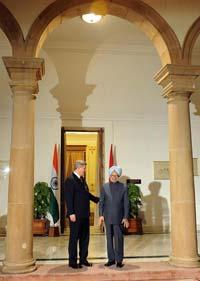Canada’s renewed nuclear march in India

Commentary
By Harbinder Singh Sewak
For over a decade, my newspapers have been in the forefront of informing readers about the secretive dealings of the Atomic Energy of Canada Ltd, (AECL) - a crown corporation that has hoovered up hundreds of millions in taxpayer money to make and sell nuclear reactors.
We exposed that Pakistan’s nuclear hero, Dr. A.Q. Khan and at least five other Pakistani nuclear scientists were linked to an underground network trading in nuclear secrets in 2003, one year before he was arrested and after strenuous pooh-poohing of our information by the AECL and the Pakistan High Commission in Ottawa.
We went behind the scenes of the AECL’s contract with the China National Nuclear Corporation (CNNC) and found some questionable manoeuvres by Jean Chretien’s Liberals in Ottawa to keep the taxpayer in the dark.
As part of that deal, your Canadian government gave a loan to the Chinese to the tune of $1.94 billion dollars under a secret arrangement, which has not been made public.
Several weeks before the deal was signed, Chretien’s China-friendly cabinet met on November 6, 1996 in a hastily arranged night-time session to make changes to regulations under the Canadian Environmental Assessment Act.
The regulations as they were that night under the Projects Outside Canada Environmental Assessment Regulations required a preliminary screening and a comprehensive environmental assessment before the Candu reactors could be built in Qinshan.
China would have none of this foreign meddling in its environment. Ottawa relented.
There were several other stories about AECL’s dealings overseas but it was the march by Canada towards nuclear reconciliation with India that was most perturbing to us.
By way of background, we gave India a nuclear research reactor in the early seventies and the South Asian behemoth promptly used the plutonium manufactured in the reactor to make a bomb.
India then tested the bomb at the infamous Pokhran desert site in 1974 triggering howls of outrage around the world and frightening Pakistan into speeding up its own nuclear program.
While working with India, Canada was training Pakistan‘s nuclear scientists and engineers in Karachi, Ontario and New Brunswick. All of them were working for Pakistan‘s nuclear godfather, Dr. A.Q. Khan,
Canada retaliated by cutting off nuclear assistance to India but by then the country had transferred enough technology to independently build seven Canadian Candu nuclear reactor ‘clones‘.
In 1998, the Canadian taxpayer funded arms race between Pakistan and India blew up with India detonating five nuclear test bombs prompting Pakistan to explode six of its own.
Canada‘s nuclear relationship with India was reignited by the Stephen Harper government, which signed a nuclear co-operation deal between the two countries in Toronto last June during the G20 summit.
The deal allows for uranium exports to India and technological exchanges that could be worth billions to Canada’s nuclear industry.
India’s Prime Minister Manmohan Singh said his country will play by the rules this time and consigned the earlier treachery to the history books.
Which brings us to last week, when Prime Minister Stephen Harper came calling on Vancouver.
Over coffee, we discussed the renewed nuclear push in India and whether we as a country are confident of the assurances given and the safeguards in place for the Canada-India nuclear process.
Harper explained;
“As you know, for reasons that, you know, I have no need to go over the history of, but as you know, there were very difficult relations between India and Canada for a long time over the nuclear power issue. That’s now a very long time ago. The India of today, as I said earlier, is an India that shares values and shares interests with this country, and is not only going to pursue a peaceful civilian nuclear power, but in negotiating with the agreement, provided through that agreement, every safeguard and every guarantee that Canada sought.
And so I have been very clear not just to our Indian counterparts, but the Canadian public that we have got to live in the 21st century. India is a peaceful power that is going to use civilian nuclear energy in what is going to be incredible growth in the decades to come, and Canada needs to be a good partner with that country. That’s why we signed the nuclear agreement. I’m confident it’s a good agreement for both of our countries.”
The Prime Minister went on to say: “we know that Canada has assets to offer India’s civilian nuclear energy industry, and we ultimately do hope that Canadians, Canadian business will find ways of participating in the growth of that industry in India, and I’ve had discussions in India, both with our own industry and with leaders of Indian industry in this regard.
That said, you know, obviously the agreement was not signed specifically to make individually contractual announcements. That was not the purpose of the agreement.”
I came away from this meeting with a new sense of confidence that our new relationship with India and the safeguards in place will prevent the proliferation of a nuclear K-mart in Asia.
Unlike the previous administration of Jean Chretien and his Liberals who shrouded our nuclear business behind a veil of secrecy, Harper seems to be open to having a public discourse of Canada’s nuclear ambitions.
This I believe will lead to more transparency and in the context of the nuclear trade, enhance Canada‘s reputation as a champion for a safer world.
As for my newspapers, we will continue our watch on Canada’s nuclear ambitions.
Harbinder Singh Sewak is the publisher of the Asian Pacific Post, the South Asian Post and The Filipino Post









